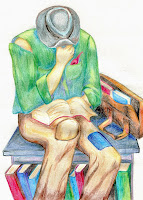Monday, March 31, 2008
Robert Owen
Robert Owen 1771-1858
Economics/Labor
By Richard E. Noble
Adam Smith was a college professor. Thomas Malthus was a preacher. David Ricardo was a Stock Broker. Robert Owen was a self educated, working stiff. The son of an Iron monger and eventual postmaster, Robert turned out to be, THE most creative entrepreneur of his day.
These were the days of the industrial revolution in England. Industry had created a monster. The lives of the working people of this time were horrendous. Children began working in factories at five years of age. They were not only worked, they were beaten, whipped, tortured and even killed. Their mothers and fathers were treated no better. The laws were such that a young boy who stole a shilling from his proprietor could be hung ... and they were. We think of Charles Dickens, today, as being overly dramatic, but his books actually watered down the real life situation. Men and women worked together in the pits of coal mines, half naked, breathing filth and dirt, and even conceiving children in this bottomless, breathless, immoral squalor. Young industrial workers who started in the factories or mines at five years of age were often dead before fourteen or fifteen, and adults by their early twenties.
Robert was a bright boy who loved to read. People took a liking to him and gave him access to their libraries. He got into textile mill work and before long found himself managing the Drinkwater Cotton Mill in Manchester, where he negotiated himself a surprisingly good wage. He was so enterprising, so productive and had such a positive influence on the workers that Mr. Drinkwater offered him a partnership in the business. Robert decided, instead, to go on his own and open his own factory. He found financial backers to supplement his savings and bought his own cotton mills. He named his enterprise in Scotland, New Lanark. His business was a phenomenal success. It became famous world wide. People came from all over the world, Kings and Queens, Nobles and Dictators. No one could believe their eyes. Robert had taken the dregs of society, the homeless, the helpless, the over used and abused, and turned them into an idyllic, model community.
It took drastic innovative ideas to accomplish this, though. No child under ten years old could work at his factories and for no longer than ten hours a day. Bosses were not allowed to whip, beat or torture the employees. Adults could work no longer than fourteen to sixteen hours a day. There was free education, free housing, and free medical care. And when there was no business for the mill the workers still got their pay checks. And everybody made money, the investors, the workers and the owners. He had created a paradise from amidst the squalor, poverty, chaos, and social abuse surrounding him. He was a miracle worker. He had discovered that all people were human beings. Treat them decently and provide an encouraging environment with food, education, shelter and even entertainment and the dregs of the earth would turn into folks just like you and I. He was a social reformer, miracle worker.
His idea had worked so well that he eventually sold his mills, took his millions and went off to reform the entire world. But, a good part of the world didn't want to be reformed, and another part thought that things were just fine the way they were. But nevertheless Robert Owen went on to make a name for himself in British and world History.






































